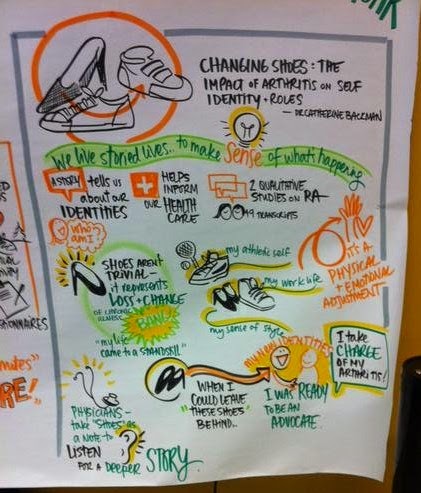That led me to think of writing a post about the psychosocial aspects of living with Rheumatoid Arthritis, only to realize that this is a topic for a book, not a blog post. Still, not starting at all is accepting defeat too soon.
Here's a relevant paper that I found among the first results of a search - Arthritis and Pain. Psychosocial aspects in the management of arthritis pain. It's not new, but when was the last time you saw anything happen fast in arthritis, with the exception of flares? The study is a perfect follow up to the shoes metaphor since Dr. Backman wrote this paper too.
To start with a definition and a direct quote from the paper:
"psychosocial factors refer to two dimensions of experience: the psychological (cognitive, affective) and social (interacting with others, engaging in life activities)".
The impacts that arthritis has can be seen in all parts of our lives, but pain is a huge topic that we are not able to ignore. It can result in what used to be small tasks, like getting dressed or washing your hair, becoming more difficult. Many activities start to take more thought and effort.
Pain can also be difficult to predict or explain when others can't see it. You can look fine but it gets more difficult to make plans and commitments. It takes a toll on your self esteem too when pain is physically and emotionally exhausting and overwhelming.
Arthritis has impacts on our families and on our communities too. It was a huge change to my family when I was suddenly too tired and sick to be consistent in what I was able to do as a mom. I know it had an effect on my children.
With my husband, I worry. I saw the toll it took on my Dad and my father in law when they had to assume the role of caregiver when both my mother in law and my own Mom had health issues late in life.
The bulk of the cleaning and shopping fall to him now, and when I was too tired to socialize after working a full week, he also missed many get-togethers.
It's a balancing act
In my work life the stress was more a pressure to achieve results that it was physical, but that was in the job I found after it became evident that working full time in a bank took too much physical effort.
What many people find is that their whole lives change and dealing with illness and changes at the same time is very challenging. I'll let Julie talk about some of the changes she has seen in her life.
"I think the biggest problem that I have socially is not being able to plan much in advance. I don't know how I am going to feel on any certain day. Sometimes, I will accept invitations with the understanding that I might not be able to make it depending on how good or bad I feel that day.
Clothing and shoes is also another consideration. Trying to find something that looks kind of dressy and nice while wearing really clunky, orthopedic type shoes is a problem.
I try to never plan anything for the morning before 10:00 a.m. It takes me that long to eat breakfast, take my medications, get dressed, etc. I have to plan to go slow in the mornings - so no early morning socializing for me anymore.
When younger, I used to be much more sociable, but I have to limit the socializing now.
I think it is all about knowing your limitations and accepting them".
Julie's outdoor cat, Grover



